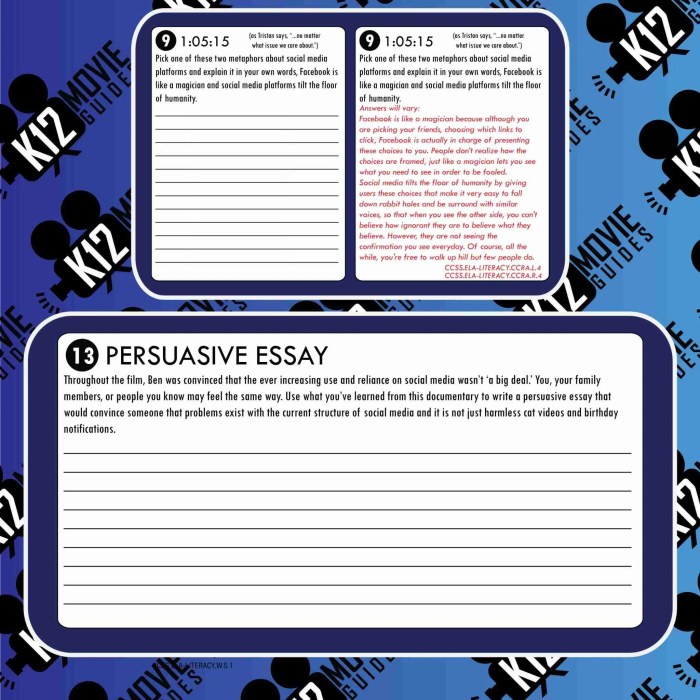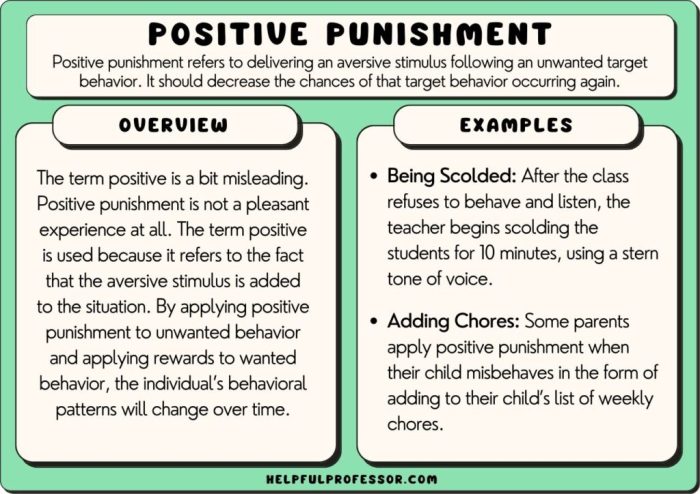The Social Dilemma Viewing Guide Answer Key unveils the profound impact of social media on our lives, delving into its addictive nature, the creation of echo chambers, the spread of misinformation, privacy concerns, mental health implications, and potential solutions.
This comprehensive guide provides a deeper understanding of the intricate workings of social media platforms, empowering individuals to navigate this digital landscape with greater awareness and agency.
Social Media Addiction

Social media addiction is a growing concern, with many people spending excessive amounts of time on social media platforms. This addiction can have a negative impact on a person’s physical, mental, and emotional health.
Social media platforms use design features to promote addiction. These features include:
- Notifications:Social media platforms send users notifications when they receive a new message, like, or comment. This can create a sense of urgency and keep users engaged with the platform.
- Variable rewards:Social media platforms use variable rewards to keep users engaged. For example, users may receive a like or comment on a post, which can provide a sense of satisfaction. However, the timing and frequency of these rewards are unpredictable, which can keep users coming back for more.
- Social comparison:Social media platforms allow users to compare themselves to others. This can lead to feelings of inadequacy and envy, which can drive users to spend more time on the platform in an attempt to improve their self-esteem.
The psychological and neurological effects of social media addiction can include:
- Increased anxiety and depression:Social media addiction has been linked to increased anxiety and depression. This is because social media can create a sense of isolation and loneliness, and it can also lead to cyberbullying.
- Reduced sleep quality:Social media use can interfere with sleep. This is because the blue light emitted from screens can suppress the production of melatonin, a hormone that helps us fall asleep.
- Changes in brain structure:Social media addiction has been linked to changes in the brain’s structure. These changes can affect attention, memory, and decision-making.
Filter Bubbles and Echo Chambers

Filter bubbles are personalized environments that filter out information that does not conform to a user’s existing beliefs and interests. Echo chambers are similar to filter bubbles, but they are more extreme. In an echo chamber, users are only exposed to information that reinforces their existing beliefs.
Social media algorithms contribute to the creation of filter bubbles and echo chambers. These algorithms are designed to show users content that they are likely to find interesting and engaging. This can lead to users being exposed to a narrow range of information, which can reinforce their existing beliefs and make them less likely to consider alternative viewpoints.
The potential consequences of living in a filter bubble or echo chamber include:
- Polarization:Filter bubbles and echo chambers can lead to polarization, as users are only exposed to information that confirms their existing beliefs. This can make it difficult for people to have constructive conversations about important issues.
- Misinformation:Filter bubbles and echo chambers can make it easier for misinformation to spread. This is because users are less likely to be exposed to information that contradicts their existing beliefs.
- Reduced empathy:Filter bubbles and echo chambers can reduce empathy, as users are less likely to be exposed to the perspectives of people who are different from them.
Fake News and Misinformation

Fake news is false or misleading information that is presented as news. Misinformation is false or misleading information that is spread unintentionally. Both fake news and misinformation can have a negative impact on society.
Social media platforms facilitate the spread of fake news and misinformation. This is because social media platforms make it easy for people to share information with others. Additionally, social media algorithms can amplify fake news and misinformation, as they are designed to show users content that they are likely to find interesting and engaging.
The impact of fake news and misinformation on society can include:
- Erosion of trust:Fake news and misinformation can erode trust in institutions, such as the government and the media. This is because people may become less likely to believe information that they see from these institutions.
- Polarization:Fake news and misinformation can lead to polarization, as people may be more likely to believe information that confirms their existing beliefs. This can make it difficult for people to have constructive conversations about important issues.
- Violence:In some cases, fake news and misinformation can lead to violence. This is because people may be more likely to act on information that they believe to be true, even if it is false.
Privacy and Data Collection

Social media platforms collect a vast amount of data about their users. This data includes information such as users’ names, ages, locations, and interests. Social media platforms also collect data about users’ activities on the platform, such as the posts they like, the comments they make, and the pages they visit.
Social media platforms use this data to target users with advertising. They can also use this data to influence users’ behavior. For example, social media platforms can use data to show users content that is likely to make them angry or sad.
This can lead to users spending more time on the platform and engaging with more content.
The ethical implications of social media data collection are complex. Some people argue that social media platforms have a responsibility to protect users’ privacy. Others argue that social media platforms are free to use users’ data as they see fit.
Impact on Mental Health
Social media use can have a negative impact on mental health. This is because social media can lead to:
- Increased anxiety and depression:Social media use has been linked to increased anxiety and depression. This is because social media can create a sense of isolation and loneliness, and it can also lead to cyberbullying.
- Reduced sleep quality:Social media use can interfere with sleep. This is because the blue light emitted from screens can suppress the production of melatonin, a hormone that helps us fall asleep.
- Body image issues:Social media can lead to body image issues. This is because social media users are often exposed to images of people who are considered to be attractive. This can lead to people feeling dissatisfied with their own bodies.
- Addiction:Social media can be addictive. This is because social media platforms use design features to promote addiction. These features can make it difficult for people to control their use of social media.
Solutions and Strategies
There are a number of potential solutions to the negative effects of social media. These solutions include:
- Regulating social media:Governments can regulate social media platforms to protect users’ privacy and to prevent the spread of fake news and misinformation.
- Promoting digital well-being:Schools and parents can promote digital well-being by teaching children how to use social media safely and responsibly.
- Developing new technologies:Researchers and developers can develop new technologies to help people control their use of social media.
Helpful Answers: The Social Dilemma Viewing Guide Answer Key
What are the key takeaways from the Social Dilemma Viewing Guide?
The guide highlights the addictive nature of social media, the creation of filter bubbles and echo chambers, the spread of fake news and misinformation, privacy concerns, and the impact on mental health.
How can I reduce my social media addiction?
Set limits on your usage, engage in other activities, and be mindful of your triggers.
What are the potential consequences of living in a filter bubble?
Filter bubbles can limit our exposure to diverse perspectives, reinforce biases, and hinder critical thinking.